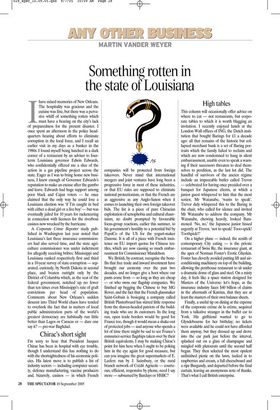High tables
This column will occasionally offer advice on where to eat — not restaurants, but corporate tables to which it is worth blagging an invitation. I recently enjoyed lunch at the London Wall offices of ING, the Dutch institution that bought Barings for £1 a decade ago: all that remains of the historic but collapsed merchant bank is a set of Baring portraits which the family failed to reclaim and which are now condemned to hang in silent embarrassment, unable even to speak a warning if their successors threaten to deal themselves to perdition, as the last lot did. The handful of survivors of the ancien régime include an impeccable butler called Trevor — celebrated for having once presided over a banquet for Japanese clients, at which a junior guest whispered to him that the most senior, Mr Watanabe, ‘wants to speak’. Trevor duly whispered this to the Baring in the chair, who called for silence and invited Mr Watanabe to address the company. Mr Watanabe, chewing heavily, looked flummoxed. ‘No, no,’ the Japanese junior hissed urgently at Trevor, ‘not to speak! Tooo-spick! Toothpick!!’ On a higher plane — indeed, the zenith of contemporary City eating — is the private restaurant of Swiss Re, the insurance giant, at the apex of Norman Foster’s Erotic Gherkin. Foster has cleverly avoided putting lift and airconditioning machinery on top of the building, allowing the penthouse restaurant to sit under a dramatic dome of glass and steel. On a misty day, it feels like a space station designed for Masters of the Universe: let’s hope, as the insurance industry faces $40 billion of claims in the aftermath of Katrina, that they are at least the masters of their own balance sheets.
Finally, a useful tip on dining at the expense of the corporate crème de la crème, acquired from a talkative stranger in the buffet car to York. His girlfriend wanted to go to Glyndebourne for her birthday; no tickets were available and he could not have afforded them anyway, but they dressed up and drove into the car park just before the interval, splashed out on a glass of champagne and mingled with plutocrats until the second half began. They then selected the most opulent unfinished picnic on the lawn, tucked in to raspberries and cream, a full cheeseboard and a ripe Burgundy, and departed before the final curtain, leaving an anonymous note of thanks. That’s what I call British enterprise.
























































 Previous page
Previous page